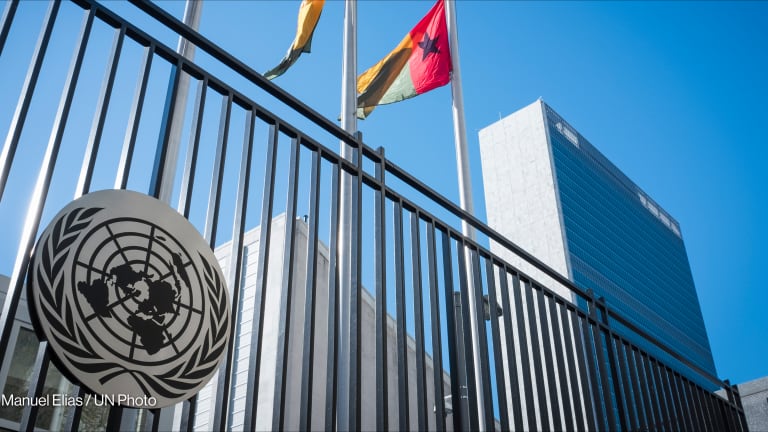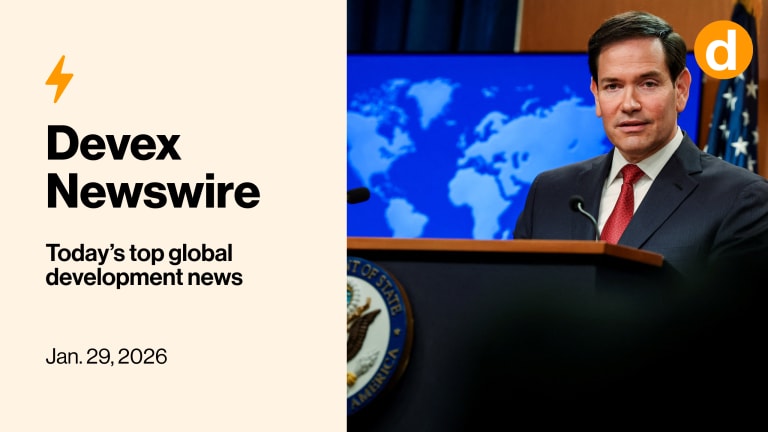
The Trump administration is urging countries to block the Palestinian bid to lead the United Nations General Assembly, warning of peace setbacks and funding cuts.
Also in today’s edition: We take you behind the scenes at the Milken Institute’s annual conference.
This is a preview of Newswire
Sign up to this newsletter for an inside look at the biggest stories in global development, in your inbox daily.
Mark your calendar: What’s next for aid in Europe? We’ll provide answers to that question at a Devex Pro briefing happening on Monday, May 12, at 10 a.m. ET (4 p.m. CET). We’ll be joined by Enabel’s Jean Van Wetter and former German development minister Heidemarie Wieczorek-Zeul. Join the over 200 registrants for the event now.
UN showdown looming
The Trump administration is pressuring foreign governments to block the Palestinian campaign to preside over the U.N. General Assembly in 2026-2027, warning it could derail peace efforts and trigger steep congressional funding cuts to the U.N., according to diplomatic sources.
In recent weeks, U.S. envoys have delivered formal diplomatic messages — known as démarches — around the world, slamming Palestine’s push to lead the 193-member body, writes Senior Global Reporter Colum Lynch. At the same time, the White House has proposed eliminating most U.S. contributions to the U.N., part of an almost 84% cut in foreign aid, and shifting funds into a $2.9 billion “America First Opportunity Fund” for handpicked allies.
The U.S. says electing Palestinian envoy Riyad Mansour would undermine ongoing diplomatic efforts and questions his impartiality, fairness, and integrity, citing “anti-Israel” rhetoric, according to the démarche. The U.S. Congress could retaliate with “statutory measures” if Mansour wins — though others doubt those threats carry weight if the U.N. budget is gutted anyway.
Mansour has backing from the Arab Group and Gulf Cooperation Council, and is the front-runner in the Asia-Pacific Group, which will lead the 2026-2027 U.N. General Assembly. A win would be historic: Palestine is not a full U.N. member, though a 2024 General Assembly resolution expanded its rights and opened the door to Palestine for a run at the presidency.
Meanwhile, the U.N. is scrambling to stay relevant. A leaked reform plan proposes shrinking the U.N. system — merging agencies, cutting senior roles, and relocating staff to cheaper locations. But the Palestine fight is threatening to eclipse those efforts entirely.
One insider warns that if successful, the Palestinian campaign would move close to triggering existing U.S. law, which requires the withdrawal of U.S. funding to U.N. agencies if Palestine is recognized as a full-fledged member state — something they describe as “a massive debacle.”
But it probably won’t make much of a difference, says Middle East analyst Hussein Ibish. “The antipathy is already at full throttle. I don’t think this is going to push the needle, you know, to 11. I think it’s already at 10, and it can’t get worse.”
Exclusive: US aims to thwart Palestine's UN recognition bid
Background: Palestinians launch bid for UN General Assembly presidency
Aid cuts hammer home
U.S. President Donald Trump’s foreign aid sledgehammer continues to produce new casualties. The prominent Christian aid organization World Vision tells Devex that it is being forced by U.S. aid cuts to lay off 11% of its U.S. workforce.
The cuts could amount to the loss of more than 110 jobs in an agency that employed 1,020 people in the United States, says Colum. It remains unclear how many World Vision workers have been laid off or furloughed overseas. Before Trump ordered steep cuts in foreign aid, World Vision employed 34,000 people in 100 countries.
In March, World Vision Vice President Edward Brown disclosed plans to lay off 3,000 workers worldwide during a confidential meeting with Pete Marocco, the Trump administration political appointee who oversaw the dismantling of the U.S. Agency for International Development.
“World Vision U.S. is implementing an 11% workforce reduction due to the reductions in public funding,” a spokesperson for the Christian aid agency tells Devex. “We are deeply grateful for the dedication and contributions of all our staff, especially those departing the organization.
“Their commitment has been invaluable to our work," Edgar Sandoval Sr., the president and CEO of World Vision USA, tells Devex in a statement. He adds that “the ministry is committed to providing transitional support and care to employees impacted by the decision.”
ICYMI: World Vision braces for mass layoffs
Funding freeze fallout: Tracking furloughs, layoffs, and cuts
Milken: Where power networks meet
It’s been a packed few days at the Milken Institute’s Global Conference 2025 at the Beverly Hilton in Los Angeles — so far the only global conference able to bring both sides of the political spectrum under the same roof (and even at the same dinner, but more on that later). This year’s conference — covering everything from critical minerals and global risk to the evolution of fintech, the future of women’s health, and a new era of opportunity — closed with one of its most well-attended events: the Milken-Motsepe Prize in FinTech.
The prize spotlighted entrepreneurs advancing financial inclusion across Africa, disbursing $2 million in awards, including $100,000 to semifinalists and a $1 million grand prize to Verto, a platform simplifying cross-border payments. Finalists showcased cutting-edge solutions: Chumz, an app using behavioral psychology to boost savings rates, and Oze, a platform improving small business lending through machine learning.
Notably, this year’s program allowed the audience to watch Mike Milken and both Patrice and Precious Motsepe — the billionaire funders of the prize — personally engaged with finalists, posing direct questions and giving the audience a window into how these business titans think about their own investments.
The agenda of this year’s conference reinforced the Milken Institute’s position in the global convening space, writes Devex Chief of Staff Meg Richardson. At a time when industries are increasingly fractured and polarized, the Milken conference remains one of the few gatherings able to draw stakeholders from across political and sectoral divides — who, given the political environment, remained surprisingly optimistic — at least on stage. Behind the scenes, there was plenty of anxious talk about what lies ahead, including for foreign aid.
Though it’s traditionally known as a finance conference, development issues featured prominently on the agenda and attracted large audiences — from the future of philanthropy to investment opportunities in Latin America, India, the Middle East, and Africa. Behind the scenes, Milken’s unique convening power was on display: One widely circulated dinner-table anecdote described Dr. Mehmet Oz, a Trump administration official, and former First Lady Jill Biden seated alongside World Central Kitchen founder José Andrés at the Milken-organized dinner on Sunday night.
Andrés, according to onlookers, used the occasion to make a direct appeal to Oz in the hope of influencing presidential decisions — the kind of informal exchange hard to imagine happening elsewhere. Meanwhile, philanthropy itself emerged as a quiet, but central, thread, with many attendees focused on potential changes to U.S. tax policy and the 501(c)(3) tax-exempt status — and what that might mean for the future of charitable giving.
Private capital, public void
You wouldn’t expect it, but in the chandelier-lit halls of the Beverly Hilton, there’s more deployable capital floating around than in every development agency combined, Devex President and Editor-in-Chief Raj Kumar says. And while it might seem worlds away from grassroots aid, this is exactly where the future of development is being quietly reshaped, he adds.
At this year’s Milken Institute’s Global Conference, two things stood out to Raj. First, business leaders are worried — asking what’s going on at USAID, the U.S. International Development Finance Corporation, and the U.N. The same execs who once shrugged off these agencies now realize they’ve relied on them to de-risk global investments. Second, major investors are starting to see themselves as unexpected players in global governance. With Washington retreating, they’re weighing whether to step up — or pull back, he says.
“That’s ultimately why I’m here,” says Raj. “Because while development’s foundations may be trembling in Washington, the decisions that could determine the flow of capital to underserved communities are being contemplated right now among these marble columns.”
+ Curious about how philanthropy can go beyond being performative and actually be impactful? Don’t miss Raj’s no-holds-barred Devex Pro briefing with Mulago Foundation CEO Kevin Starr on Wednesday, May 14, at 12 p.m. ET (6 p.m. CET). The conversation will cut through conference platitudes to deliver actionable insights for forward-thinking leaders determined to shape development's future rather than merely react to it. Register now to secure your spot.
Africa at a crossroads
As global powers rewrite the rules on trade, aid, and security, a panel of African experts at the Milken conference asked: how can the continent turn turbulence into opportunity?
The panel — Admiral Issah Adam Yakubu, Ghana’s former chief of the naval staff and current chairman of the Gulf of Guinea Maritime Institute; Aigboje Aig-Imoukhuede, chairman of Access Holdings; Comfort Ero, head of the International Crisis Group; and Patrick Njoroge, former governor of Kenya’s Central Bank — explored the intersection of governance, defense, and finance amid mounting instability.
Their discussion ranged from Sudan’s descent into what Ero called “a humanitarian catastrophe” and “a model of proxy conflict,” to the Sahel’s coups, where “once you get a seat at the table, nobody talks about how you are running your country,” argued Yakubu.
Africa’s structural weaknesses — fragmented borders, underfunded defense sectors, and weak regional institutions — were a recurring theme, as was frustration with a political class seen as unaccountable. “Transparency doesn’t lead to accountability,” Njoroge warned. “You cannot eat GDP. There’s democracy, but no one eats democracy.”
Despite the bleak outlook, the panel also pointed to Africa’s resilience and potential. The speakers highlighted the private sector’s advances in infrastructure and energy, and efforts to train a new generation of public servants who can lead with strategy, integrity, and results. There were warnings, however, that without urgent action to create jobs for Africa’s growing youth population, the continent risks a demographic disaster. “Poor people rarely fight,” Ero noted. “It is the middle class that also take up the arms.”
Ultimately, the message was clear: Africa needs more than external aid or mineral deals. It needs better leadership, shared purpose, and investment in people — especially the young — before disillusionment overwhelms hope. “Africa lags behind in many respects,” said Aig-Imoukhuede. “It’s largely a management problem ... if we transform the quality of leadership, we're going to transform the results on the people.”
Related opinion: Overreliance on aid got us here — now here’s what we do
Further reading: Global health expert blasts aid addiction and dysfunctional system (Pro)
+ Not yet a Devex Pro member? We offer a 15-day free trial. Try it out today to access an unrivaled deeper analysis of the development sector, exclusive events and briefings with sector leaders on the evolving aid world, timely and relevant curated career resources, and more. Check out some of the content exclusive to Pro readers.
In other news
Global temperatures have averaged 1.58°C above pre-industrial levels over the past year, signaling that breaching the Paris Agreement’s 1.5°C limit is now inevitable. [Financial TImes]
The World Food Programme has stopped food rations to 1 million refugees in Uganda due to a severe funding shortfall caused by aid cuts by donors such as the U.S. and the U.K. [The Guardian]
Bill Gates met with Indonesian President Prabowo Subianto yesterday to discuss health initiatives, including the development of a tuberculosis vaccine that will be tested in the Southeast Asian country. [Arab News]
Sign up to Newswire for an inside look at the biggest stories in global development.
Search for articles
Most Read
- 1
- 2
- 3
- 4
- 5








